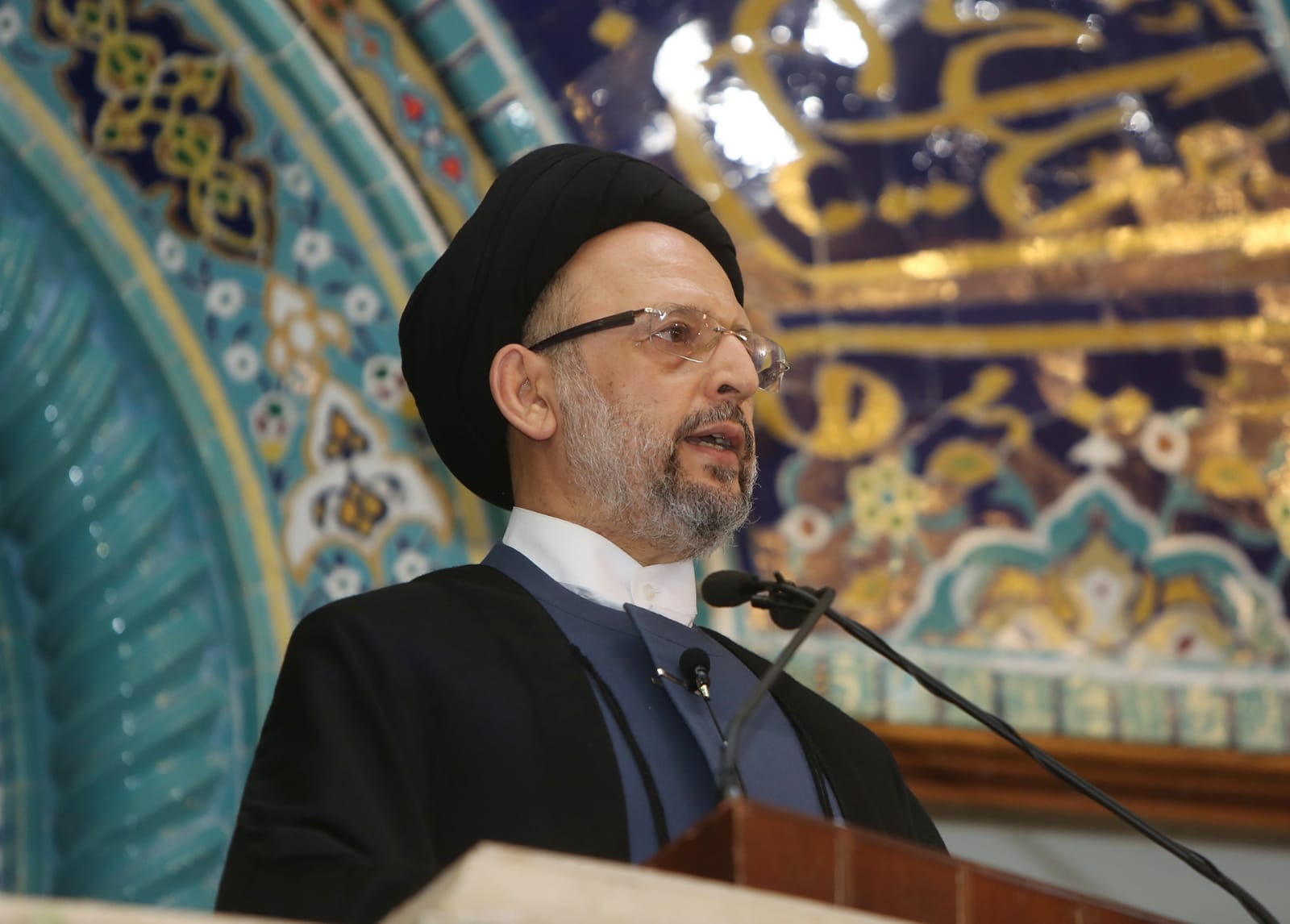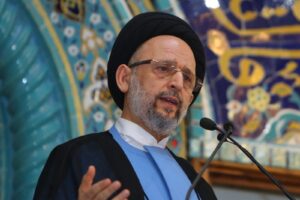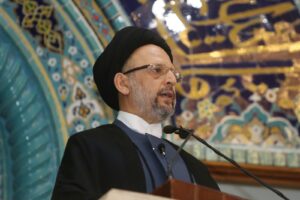How to save ourselves in the Hereafter
In The Name of Allah, The Compassionate, The Merciful
His Eminence, Sayyed Ali Fadlullah, delivered the two Friday prayer sermons at the Imamain Al-Hassanain Mosque, Shawal 19, 1443H. – May 20, 2022. Several prominent religious scholars, dignitaries and believers attended the Jumu’a prayer. Following is the edited text of the two sermons :
The first sermon
How to save ourselves in the Hereafter
Allah, The Most Exalted, says in His Glorious Book: There is none in the heavens and the earth but comes unto the Most Beneficent (Allah) as a slave.. Verily, He knows each one of them, and has counted them a full counting.
And everyone of them will come to Him alone on the Day of Resurrection (without any helper, or protector or defender). Verily, those who believe [in the Oneness of Allah and in His Messenger and work deeds of righteousness, the Most Beneficent will bestow love for them. Allah, The Most Exalted, speaks the truth.
In many of its Ayats, the Holy Quran was concerned to make man aware of the fact that he should always be mindful of: Things in the Hereafter will not be the same as those in this life. If man on earth can seek the support of his family, sect party and the like he would stand before God all alone; that is he would be stripped of all sources of wealth and power . He would then be asked about all what had happened to him . The only thing that will save him in that moment are his good deeds. Allah says: And [for] every person We have imposed his fate upon his neck, and We will produce for him on the Day of Resurrection a record which he will encounter spread open. [It will be said], "Read your record. Sufficient is yourself against you this Day as accountant. And On the Day when every soul will come disputing for itself, and every soul will be fully compensated for what it did, and they will not be wronged. To
To make this picture clearer and more immersed in our minds The Glorious Quran presented many scenes that we will witness on the Day of Judgment: It will be said to them], “And you have certainly come to Us alone as We created you the first time, and you have left whatever We bestowed upon you behind you. This Ayat clearly indicates that one will not come on the Day of Judgment carrying his wealth and properties . That is why when he asks about his money he would be told: do you own anything except what you give in charity such that you’ve spent it or what you eat except that you have eaten ,or your wear except that you’ve worn out.
The second scene: when the deafening cry shall be sounded on the Day when each man shall flee from his brother, and his mother and his father; and his consort and his children; on that Day each will be occupied with his own business, making him oblivious of all save himself. Some faces on that Day shall be beaming with happiness, and be cheerful and joyous. Some faces on that Day shall be dust-ridden, enveloped by darkness. This Ayat points out to the fact his family including his wife and children whom he worked all his life to support will flee from him on the Day of Judgment and refuse to give him any of their good deeds.
The third scene shows how would the followers deal with those whom they followed and how would the latter deal with their followers : And they should consider that] when those who have been followed disassociate themselves from those who followed [them], and they [all] see the punishment, and cut off from them are the ties [of relationship] Those who followed will say, "If only we had another turn [at worldly life] so we could disassociate ourselves from them as they have disassociated themselves from us." Thus will Allah show them their deeds as regrets upon them. And they are never to emerge from the Fire.
In the fourth scene, the Quran conveys to us what would the people who obeyed their leaders, and neglected God’s commands say : And they will say, "Our Lord, indeed we obeyed our masters and our dignitaries, and they led us astray from the [right] way.
Our Lord, give them double the punishment and curse them with a great curse."
The fifth scene depicts the answer of those who were followed: And they will come out [for judgement] before Allah all together, and the weak will say to those who were arrogant, "Indeed, we were your followers, so can you avail us anything against the punishment of Allah ?" They will say, "If Allah had guided us, we would have guided you. It is all the same for us whether we show intolerance or are patient: there is for us no place of escape."
The six scene : Every soul, for what it has earned, will be retained. Except the companions of the right,[Who will be] in gardens, questioning each other
About the criminals,[And asking them], "What put you into Saqar?"
They will say, "We were not of those who prayed, Nor did we used to feed the poor. And we used to enter into vain discourse with those who engaged [in it]. These Ayats explain the reasons that drove those people to Hell. They agreed to what the people agreed on and refused what they refused, even if it were against the will of God .
That is why, dear loved ones. We ought to be conscious and not an echo to what others say or become prisoners of our interests and desires. Our only goal in all our stances should be to submit to God’s will Who calls us to the good only . We should know that those whom we might sell our principles and dignity for will leave us to our destinies on the Day of Judgment and could do us no good on that day…
The second Sermon
Worshippers of Allah, The Most Exalted, I advise you and myself to recall what happened in the aftermath of the battle of Uhud, when Abu Sufian decided after leaving for Mecca to return to Medina to finish the Muslims off. When the news reached the Muslims and the Messenger (p.), they all went out to fight him. When Abu Sufian saw how determined they were, he changed his mind and went back to Mecca. The Holy Quran recorded this incident : ” …to whom (the believers )hypocrites said, “Indeed, the people have gathered against you, so fear them.” But it [merely] increased them in faith, and they said, “Sufficient for us is Allah, and [He is] the best Disposer of affairs.”
So they returned with favor from Allah and bounty, no harm having touched them. And they pursued the pleasure of Allah, and Allah is the possessor of great bounty.
This Ayat did not refer to an isolated incident in history, but to one that is always present in all challenges which we are currently engaged in confronting many of them.
We begin by Lebanon, where the Lebanese were able to carry out the elections without any significant incident despite all the political and sectarian incitement and the exchange of accusations even to the level of treason.
As we appreciate the Lebanese ability to overcome all these tensions and choose, through their votes, those who carry their choices and aspirations, we call for eliminating all the consequences that might have been produced by the election rhetoric , which unfortunately depended on creating fears among the Lebanese to the extent that they left with no common factors that would enable them to reunite and coexist although they are in a dire need for national unity in this stage as well as all stages.
In this respect, we would like to praise all the calls that were made after the elections to put an end to the incitement rhetoric and all the provocative practices to celebrate the victories of certain parties.
We would also like to stress yet again the need not to use religion or sectarian divisions as a means of deployment or provocation and incitement. Heavenly messages did not come to blow up the bridges among people. It came to build them and establish humanitarian and brotherly relations among all people… and this is what imam Ali pointed to in his letter to his wali on Egypt : for they(people) are of two kinds: either they are your brothers in faith or in creation… So grant them your pardon and your forgiveness to the same extent that you hope God will grant you His pardon and His forgiveness.
At the same time , we call on the members of the new parliament to rise to the level of the hopes of those elected them in performing all their tasks whether legislative or overseeing the executive branch .They have to make good on their promises and not consider them as electoral promises that are forgotten once the elections are over. They ought to know that they would not be reelected if they do not perform the role that is demanded of them. The new parliament has a lot to do in this difficult stage the country is passing through. This is not the time for scoring points or engaging in feuds and conflicts , or raising issues that it is not the right time for , so that the struggle we had witnessed throughout the previous stage would not be transferred to the new parliament…
The time now is the time of saving a collapsing country. Whoever promised change has to prove it; something that cannot be done except through cooperation and joining hands.
We would like the diversity we witness in the new parliament to contribute in creating the vitality needed for accomplishment … and not widen the enmity between the already existing alignments.
The Lebanese will no longer accept the excuse that we have repeatedly heard from the parties represented in the government and the parliament and justify their failure to perform their responsibilities by saying that the others did not let them .Those who cannot accomplish have to leave their place for others…
In occupied Palestine, where the enemy continues its aggressions to force the Palestinians to yield and obliterate their identity and abort their Intifada…
At the same time, we call for being vigilant of what the enemy is planning to on the level of the entire region, as evident in its ongoing maneuvers that although we feel that they aim at intimidation, we are afraid they might be a prelude for a new aggression that we should prepare for by enhancing our national unity.




